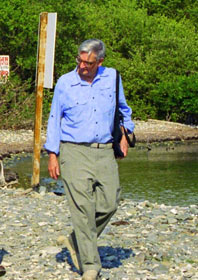TV Program Description
Original PBS Broadcast Date: May 20, 2008
At age 78, E.O. Wilson is still going through his "little
savage" phase of boyhood exploration of the natural world. In
"Lord of the Ants," NOVA profiles this soft-spoken Southerner
and Harvard professor, who is an acclaimed advocate for ants,
biological diversity, and the controversial extension of
Darwinian ideas to human society.
Actor and environmentalist Harrison Ford narrates this
engaging portrait of a ceaselessly active scientist and
eloquent writer, who has accumulated two Pulitzer Prizes among
his many other honors. Says fellow naturalist David
Attenborough: "He will go down as the man who opened the eyes
of millions 'round the world to the glories, the values, the
importance of—to use his term—biodiversity."
Wilson is also renowned for two seemingly unrelated roles.
First, he is the "ant man," whose infectious enthusiasm for
his scientific specialty has encouraged many house dwellers to
reach for a magnifying glass instead of ant traps when faced
with these tiny invaders. NOVA films Wilson exuberantly
plunging his hand into a fire-ant bed and then calmly
observing that each of the scores of stings he is receiving
feels like "the touch of a hot needle." (Wilson's fearlessness
with wild animals goes way back, as our
excerpt from
his autobiography shows.)
Second, Wilson hit the headlines and became a lightning rod in
academic circles for his 1975 book
Sociobiology: The New Synthesis, which holds that
evolutionary principles can explain social behavior throughout
the animal kingdom, including in humans. (Sociobiology is just
one of several scientific fields he has either invented
outright or greatly influenced—see
Man of Ideas.)
At the time, critics warned that Wilson was promoting a
dangerous idea with roots in biological determinism, which in
the past had fueled the eugenics movement. (Wilson was even
attacked physically, having a pitcher of ice water poured over
his head as he stood up to give a talk.) The controversy has
since calmed somewhat, as experimental evidence shows that
genes do play a role in aspects of behavior.
In fact, these two elements of Wilson's work—ants and
sociobiology—are intimately connected, because ants are
among the most social of animals. Characteristically, Wilson's
wide-ranging mind could look beyond one domain to another. "He
is able to step back not just one pace but three paces and see
the entire panorama of not just invertebrates but of the whole
magic complex web of organisms—animals and plants," says
Attenborough.
Wilson's latest step back has shown him more unequivocally
than ever that the complex web of life in which he has
delighted since a child is under threat in many of the most
biologically diverse regions of the world. Accordingly, he has
become a tireless organizer and spokesman for preserving the
world's threatened species. (See
A Conversation With E.O. Wilson
for some of his latest thinking on conservation.)
And he has his own research to back him up. NOVA visits a
small island in the Florida Keys where Wilson and biologist
Daniel Simberloff started a unique experiment in 1965. They
first made an inventory of every living species on the island.
Then they hired an exterminator to wipe them all out.
Over the next few years they documented the recolonization and
rebirth of life on the island, showing that, in general, the
smaller an area of land, the fewer the number of species it
can support and the higher the risk of extinction. "This is
one of the reasons why conservationists have a sound
scientific basis for trying to get larger reserves," says
Wilson. "It's good insurance. It means we can save more
species over the long term."
And he's not stopping there. Wilson's ultimate dream is to
catalog every species of life on the planet, a number that
probably vastly exceeds the inventory of life to date. He
calls it the Encyclopedia of Life, and he now has the backing
of Harvard University, the Smithsonian Institution, and
several other organizations to make it a reality. The young
naturalist who never grew up surely has even more up his
sleeve.

Program Transcript
Program Credits

